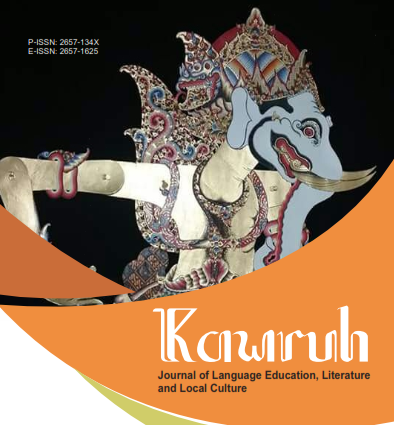Kajian Bentuk, Makna dan Nilai dalam Tradisi Bersih Desa di Desa Loano Kecamatan Loano Kabupaten Purworejo
DOI:
https://doi.org/10.32585/kawruh.v6i1.4519Abstract
This research aims to describe the form of implementation, the meaning of ubarampe symbols and values in the tradition of clean village in Loano village, Loano sub-district, Purworejo regency. The primary data sources of this research are informants who have in-depth knowledge of the village cleaning tradition in Loano. Secondary data sources are video of the implementation, documentation, interview recordings, Loano village official website and articles from similar research. Data collection techniques using non-participant observation, unstructured interviews and documentation in the form of photos, videos of implementation and recordings of interviews with informants. Data validity techniques using triangulation of data sources were analyzed by interactive analysis. The research used a qualitative descriptive method with an ethnographic approach. The results of the research on the form of implementation of the clean village tradition obtained several elements in its implementation, such as (1) deliberation, (2) looking for sponsors, (3) initial preparation, (4) umbul prayer, (5) tandang pawiyatan, (6) grand recitation, (7) village fence, (8) grebeg Loano, (9) special village deliberation. The offerings in the ubarampe have symbolic meanings, such as: white tumpeng depicts a form of prayer, ingkung pair as a form of human balance. The values contained in the clean village tradition include: economic value, social value, entertainment value, aesthetic value, religious value, tradition value, and custom value. The values reflected in the clean village tradition can be used as a guide to life because it is still relevant to the lifestyle of the Loano village community
Downloads
References
Aryanto, Aris. 2013. “Kajian Folklor Dalam Tradisi Larungan Di Desa Kertojayan Kecamatan Grabag Kabupaten Purworejo.” Jurnal Pendidikan, Bahasa, Sastra, Dan Budaya Jawa 03(6): 65–74.
Cathrin, Shela. 2017. “Tinjauan Filsafat Kebudayaan Terhadap Upacara Adat Bersih-Desa Di Desa Tawun Kecamatan Kesremen Kabupaten Ngawi Jawa Timur.” Jurnal Filsafat 27(1): 31–64.
Elfa Puspaningtyas, Anggita. 2017. “Partisipasi Masyarakat Dalam Tradisi Bersih Desa (Studi Kasus Partisipasi Masyarakat Dalam Bersih Desa Tanjungsari Di Dukuh Dlimas, Desa Dlimas, Kecamatan Ceper, Kabupaten Klaten).”
Endraswara, Suwardi. 2006a. Metode Penelitian Kebudayaan. Yogyakarta: Gadjah Mada University Press.
Endraswara, Suwardi. 2006b. Metode Teori Teknik Penelitian Kebudayaan: Ideologi, Epistemologi, Dan Aplikasi. Yogyakarta: Pustaka Widyatama.
Handono, Tri & Mahatmaharti, Agung Kesna. 2021. “Nilai Pendidikan Budaya Dan Budi Pekerti Pada Tradisi Bersih Desa.” Urnal Pusat Penelitian Dan Pengabdian Kepada Masyarakat (P3M) STKIP PGRI Jombang 03(1): 356–66.
Herusatoto, Budiono. 2005. Simbolisme Dalan Budaya Jawa. Yogyakarta: Hanindita.
Jatmiko, Agil Pujiono dan Pamungkas, Yohanes Hanan. 2016. “Tradisi Upacara Bersih Desa Situs Patirth?n Dewi Sri Di Desa Simbatan Wetan, Kecamatan Nguntoronadi, Kabupaten Magetan (Kajian Tentang Kesejarahan Dan Fungsi Upacara).” Jurnal Pendidikan Sejarah 4(2): 578–92.
Moleong, Lexy J. 2017. Metode Penelitian Kualitatif (Edisi Revisi). Bandung: PT Remaja Rosdakarya.
Nuraseh, Sita. 2023. “Selametan Sebagai Wujud Upaya Syukur Dalam Kontradiksi Budaya Jawa:Jaman Dahulu Dan Sekarang.” Jurnal Pendidikan Bahasa Jawa 07(1): 146–60. https://doi.org/doi.org/10.20961//sabpbj.v7il.5555261.
Purwadi. 2012. Folklor Jawa. Yogyakarta: pura Pustaka Yogyakarta.
Rosiana, Anita. 2020. “Nila-Nilai Yang Terkandung Di Dalam Tradisi Ritual Pengobatan Bedikei Suku Sakai Desa Muara Basung Kecamatan Pinggir Kabupaten Bengkalis Provinsi Riau.”
Sugiyono. 2016. Metode Penelitian Kuantitatif, Kualitatif, Dan R&D. Bandung: Alfabeta.
Sztompka, Piotr. 2017. Sosiologi Perubahan Sosial. Jakarta: Prenada Media.
La vida, fivea. 2018. Mutu Manikam. Yogyakarta. Garudhawaca.
Yuningtyas, Laras Andita, Sigit Pranawa, and Yuhastina Yuhastina. 2020. “The Meaning of the Ceprotan Tradition in Bersih Desa for the People of Sekar Village.” Harmoni Sosial: Jurnal Pendidikan IPS 7 (2): 150–59. https://doi.org/10.21831/hsjpi.v7i2.27978.
Downloads
Published
How to Cite
Issue
Section
License
Copyright (c) 2024 Istikomah

This work is licensed under a Creative Commons Attribution-ShareAlike 4.0 International License.
Authors who publish with the Kawruh: Journal of Language Education, Literature and Local Culture agree to the following terms:
- Authors retain copyright and grant the journal the right of first publication with the work simultaneously licensed under a Creative Commons Attribution License (CC BY-SA 4.0) that allows others to share the work with an acknowledgment of the work's authorship and initial publication in this journal.
- Authors are able to enter into separate, additional contractual arrangements for the non-exclusive distribution of the journal's published version of the work (e.g., post it to an institutional repository or publish it in a book), with an acknowledgment of its initial publication in this journal.
- Authors are permitted and encouraged to post their work online (e.g., in institutional repositories or on their website) prior to and during the submission process, as it can lead to productive exchanges, as well as earlier and greater citation of published work.




